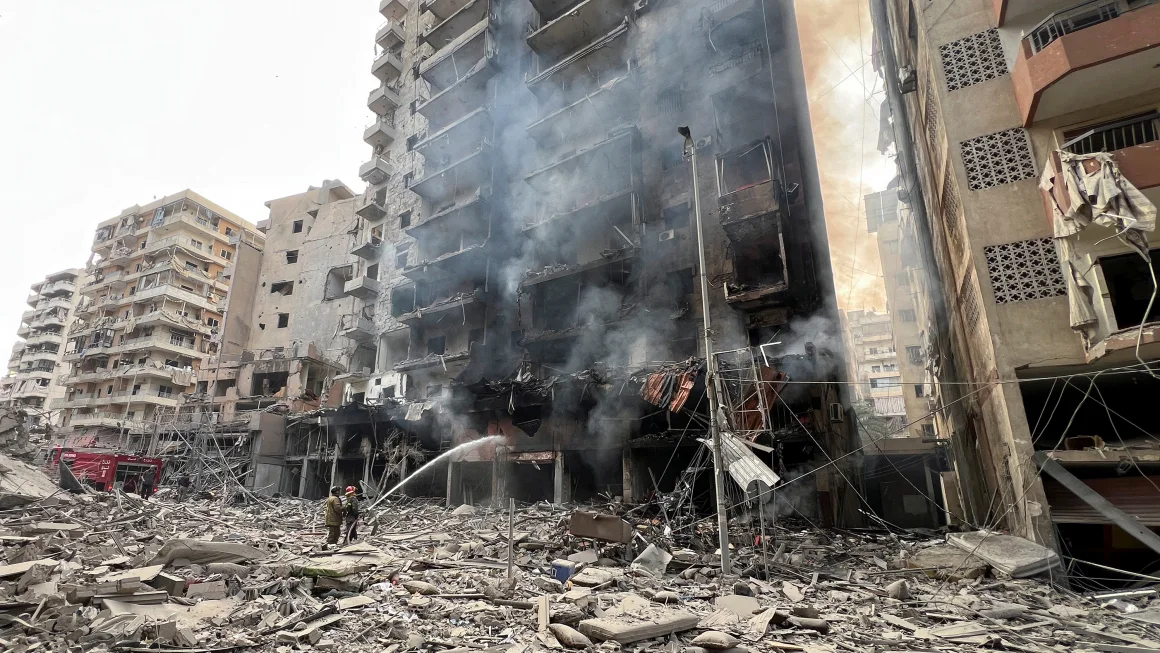An estimated 35,000 displaced civilians have crammed into the grounds of Gaza City’s main hospital, sitting under trees in the empty grounds, as well as inside the building’s lobby and corridors, hoping they will be protected from the fighting, medical officials said.
“People think this is the only safe space after their homes were destroyed and they were forced to flee,” said Dr. Medhat Abbas, a Health Ministry official. “Gaza City is a frightening scene of devastation.”
Basic necessities like food, fuel and drinking water also were running low because of a complete Israeli siege.
Water has stopped coming out of taps across the territory. Amal Abu Yahia, a 25-year-old pregnant mother in the Jabaliya refugee camp, said she waited anxiously for the few minutes each day or every other day when contaminated water trickles from the pipes in her basement. She rations it, prioritizing her 5-year-old son and 3-year-old daughter. She said she is drinking so little herself, she only urinates every other day.
Near the coast, the only tap water is contaminated with Mediterranean Sea water because of the lack of sanitation facilities. Mohammed Ibrahim, 28, said his neighbors in Gaza City have taken to drinking the salt water.
“Gaza has been out of water for almost three days, we have no power, no electricity,” said Inas Hamdan, a spokesperson for the U.N. agency for Palestinian refugees. “If there is no humanitarian corridor, consequences will be catastrophic.”
The Israeli military’s evacuation order demands the territory’s entire population cram into the southern half of Gaza as Israel continues strikes across the territory, including in the south.
Rami Swailem said he and at least five families in his building decided to stay put in his apartment near Gaza City. “We are rooted in our lands,” he said. “We prefer to die in dignity and face our destiny.”
Others were looking desperately for ways to evacuate. “We need a number for drivers from Gaza to the south, it is necessary #help,” read a post on social media. “We need a bus number, office, or any means of transport,” read another.
The U.N. refugee agency for Palestinians expressed concern for those who could not leave, “particularly pregnant women, children, older persons and persons with disabilities,” saying they must be protected. The agency also called for Israel to not target civilians, hospitals, schools, clinics and U.N. locations.
Al-Shifa hospital was receiving hundreds of wounded every hour and had used up 95% of its medical supplies, hospital director Mohammad Abu Selim said. Water is scarce and the fuel powering its generators is dwindling.
“The situation inside the hospital is miserable in every sense of the word,” he said. “The operating rooms don’t stop.”
Patients and personnel from the Al Awda Hospital in Gaza’s far north spent part of the night in the street “with bombs landing in close proximity,” the medical aid group Doctors Without Borders said.
An Israeli military spokesperson, Jonathan Conricus, said the evacuation was aimed at keeping civilians safe and preventing Hamas from using them as human shields. He urged people in the targeted areas to leave immediately and to return “only when we tell them that it is safe to do so.”
“The Palestinian civilians in Gaza are not our enemies. We don’t assess them as such, and we don’t target them as such,” Conricus said. “We are trying to do the right thing.”
Thousands of people crammed into U.N.-run schools across Gaza.
“I came here with my children. We slept on the ground. We don’t have a mattress, or clothes,” said Howeida al-Zaaneen, 63, who is from the northern town of Beit Hanoun. “I want to go back to my home, even if it is destroyed.”
The Israeli military said its troops conducted temporary raids into Gaza on Friday to battle militants and hunted for traces of some 150 people — including men, women and children — who were abducted during Hamas’ shocking Oct. 7 assault on southern Israel.
The Gaza Health Ministry said Saturday that over 2,200 people have been killed in the territory, including 724 children and 458 women. The Hamas communications office said that Israel has “completely demolished” over 7,000 housing units so far.
Hamas’ surprise attack killed more than 1,300 people on the Israeli side, most of them civilians, and roughly 1,500 Hamas militants died during the fighting, the Israeli government said.
Egyptian officials said the country’s Rafah border crossing with Gaza would open Saturday for the first time in days to allow foreigners out. But by Saturday night there had been no movement. There were believed to be some 1,500 people in Gaza holding Western passports and additional people with passports from other parts of the world.
Israel’s raids into Gaza on Friday were the first acknowledgment that Israeli troops had entered the territory since the military began its round-the-clock bombardment in retaliation for the Hamas massacre. Palestinian militants have fired more than 5,500 rockets into Israel since the fighting erupted, the Israeli military said.
Israel has called up some 360,000 military reserves and massed troops and tanks along the border with Gaza. A ground assault in densely populated Gaza would likely bring even higher casualties on both sides in brutal house-to-house fighting.
U.S. Secretary of State Antony Blinken met with Saudi Foreign Minister Faisal bin Farhan in Riyadh on Saturday, and both called for Israel to protect civilians in Gaza.
“As Israel pursues its legitimate right to defend its people and to trying to ensure that this never happens again, it is vitally important that all of us look out for for civilians,” Blinken said.
Hamas said Israel’s airstrikes killed 22 hostages, including foreigners. It did not provide their nationalities. The Israeli military denied the claim. Hamas and other Palestinian militants hope to trade the hostages for thousands of Palestinians held in Israeli prisons.
In the occupied West Bank, the Palestinian Health Ministry says 53 Palestinians have been killed since the start of the war, including 16 on Friday. The U.N. says attacks by Israeli settlers have surged there since the Hamas assault.
Krauss reported from Jerusalem. Associated Press writers Isabel DeBre and Julia Frankel in Jerusalem, Samya Kullab in Baghdad, Samy Magdy in Cairo, Ashraf Sweilam in El-Arish, Egypt, Kareem Chehayeb in Beirut and Matthew Lee in Riyadh contributed to this report.



